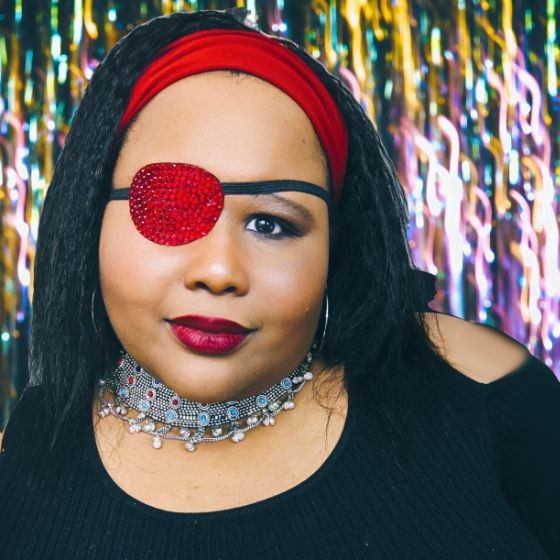Interview with Crystal Preston-Watson

Every week, we meet with audience members with disabilities who are willing to come forward and share a little bit about their own personal journey and experiences, attending live, in-person, or virtual speaking or training events. Through their unique and generous perspectives, speakers, trainers, facilitators, and other communication professionals can hopefully learn about some of the things that they do well, but also (and maybe more importantly) about some of the things they could improve to provide an experience that is truly inclusive of everyone.
Meet Crystal, an audience member who has a visual impairment and a social anxiety disorder
So without further ado, let’s dive right into this week’s interview with Crystal Preston-Watson (she/her). Crystal has a visual impairment and social anxiety disorder. She comes to us from Colorado, USA.
Introductions
QUESTION 01 Can you tell us a bit about yourself, and how your disability might impact your experience, as someone who attends live in-person and virtual events?
I am an accessibility and quality engineer based in Denver, Colorado, where I live with my lovely spouse and two cats.
Currently, I am the senior digital accessibility analyst at Salesforce. Regarding disabilities, I have a permanently scarred macula in my right eye due to an infection of toxoplasmosis when I was born. I also have keratoconus, which affects both eyes. I also have Social Anxiety Disorder, which I wrote about in 2019 as Anxiety Chronicle 75 on thelily.com.
When it comes to my visual impairment and live, in-person and virtual events, the most significant impact is materials being geared toward those who don’t have impairments, like tiny prints, poor color contrast, etc. The effect of anxiety is how interpersonal interactions are handled in sessions and workshops.
Things that ruin the experience
QUESTION 02 Thinking back on some of your experiences attending in-person or virtual events, what are some of the worst things speakers, trainers, and other communication experts can do to ruin your experience as an attendee?
Money grabs where there are a lot of shortcuts taken. This is different from events that are just underfunded or run out of money due to legitimate reasons. These are events that are poorly planned, vanity events. As you can imagine, these events are nightmares for all attendees, but especially so for disabled people.
I was at one conference where everyone attended the same sessions in one room and had assigned seating. That was something I never want to experience again. That was also the conference where a speaker and attendee argued during the session. That was interesting in a way I never want to experience again.
Things that make a positive impact
QUESTION 03 Can you share some of the great things speakers, trainers, and other communication experts sometimes do that make a positive impact on your ability to fully enjoy your in-person or virtual event experiences?
Taking the temperature of the audience/attendees. This means they aren’t going on assumptions and outdated projections about who is (or isn’t) in the room in-person or virtually, and working on full steam with no input before or during the event. There are always projections and thoughts about who will attend beforehand, but that doesn’t always sync up with the event.
Make sure you are willing and available to communicate with attendees who need accommodations and have the ready flexibility when things are happening to make adjustments when barriers are discovered. Even if things aren’t 100% perfect, it can still make for an an enjoyable event.
Sharing a piece of advice
QUESTION 04 If you had one piece of advice to give speakers, trainers, and other communication experts, so their content became more inclusive of people who have disabilities, what would it be?
Talk to people with disabilities, but not just about their disabilities, accessibility, or shop/career talk. Have actual conversations about their life, your life, the latest viral content, etc. I think the one thing I find shocking is how many people are intimidated by interacting with someone that is disabled. You can’t be inclusive or act in good faith if you have a barrier of fear or unease.
Wrapping up
QUESTION 05 Thank you for sharing some of your insights with us today. As we wrap up our conversation, is there anything that you’d like to add, such as another thought, another piece of advice, another perspective, etc.?
I have a lot, but it will be more than 150 words. Honestly, I think most of these answers are over 150 words.
Connect with our guest on social
Interested in knowing more about our guest this week? You can follow Crystal on LinkedIn and Twitter.

About Denis Boudreau
Denis Boudreau is a consultant, trainer, and speaker specializing in digital accessibility and disability inclusion. He works with organizational leaders who want to equip their teams with the skills to create accessible websites and digital products – so no one is left behind. A Certified Professional in Web Accessibility (CPWA), Denis has trained thousands of web professionals over the past 20+ years and delivered hundreds of workshops in both English and French. He has helped leading brands like Netflix, Salesforce, and Victoria’s Secret embed accessibility into their digital strategies, empowering them to meet legal obligations, improve user experience, and connect with more people, more effectively.
